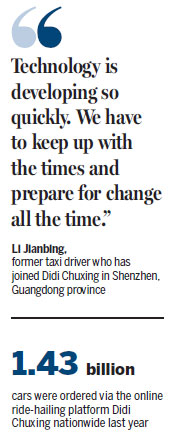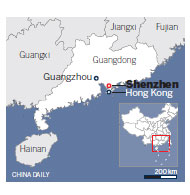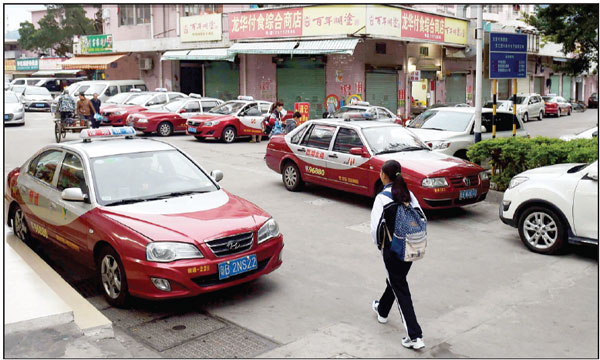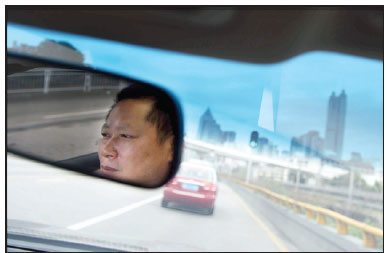End of the road for the 'taxi-driver village'?
Updated: 2016-04-22 07:32
By Zhou Mo(China Daily)
|
|||||||||
The rise of car-hailing companies has crippled the independent cab trade in Dawang, a small settlement in southeastern China that's home to more than 1,000 drivers and their families. Zhou Mo reports from Shenzhen, Guangdong province.
For about a decade, residents of the Luohu district of Shenzhen, Guangdong province, watched a ritual every evening at dusk as a fleet of taxis spiraled along a narrow mountain road and entered Dawang at the foot of Wutong Mountain.
But the past year has seen changes in "taxi-driver village", as Dawang is known. New online cab-hailing services have been snapping up business, resulting in many taxis disappearing and being replaced by private cars whose drivers use the new platforms.
Lured by the good money, many drivers in the village have abandoned their taxis and started working for private companies, such as Didi Chuxing and Uber.
Dawang gained its nickname thanks to the large number of cab drivers who live there. Few of them are locals, though; and most come from Youxian, a county in the central province of Hunan.
About 1,000 people in the village are now employed exclusively by Didi Chuxing, according to an article published on FiftyKM, one of the company's accounts on WeChat, a popular instant-messaging platform.
Full-time drivers are only allowed to use private vehicles, so every defection means one taxi fewer on the roads.
"Driving a taxi isn't profitable anymore. We (the drivers) had to find another way to survive," said Li Jianbing, a driver from Youxian who joined Didi Chuxing in September.
"Driving a car on the company's platform, I can earn about 12,000 yuan ($1,856) a month. If I still drove my taxi, I would only make 6,000 to 7,000 yuan, which would make it hard to feed my family in the big city."
In the past two years, the popularity of the new services has soared in China. Didi Chuxing operates in hundreds of cities, with daily orders reaching 10 million. The company said 1.43 billion cars were ordered via its platform nationwide last year.
Safety issues
However, while the new services are popular with the public, their sudden market dominance, which has resulted in the need to recruit more drivers, has raised questions about passenger safety.
A report published by the Shen-zhen Transportation Commission estimates that 1,425 drivers working for online platforms have a history of drug abuse, and 1,662 had serious criminal records before taking up their current jobs, raising questions about screening procedures.
The city government has pledged to step up efforts to regulate the emerging industry to ensure fair competition and passenger safety. It has also urged online ride-hailing companies to comply with the law, accept their social responsibilities and resolve problems quickly.
"The relevant government departments will supervise online car-hailing platforms, step up efforts to crack down on illegal operations, and accelerate the formulation of policies to regulate the industry to ensure a free market for transportation and satisfy the needs of local residents," said an official from the transport commission, who preferred not to be named.
When contacted by China Daily, Didi Chuxing declined to discuss the findings outlined in the commission's report.
The new services have hit the traditional taxi industry hard, with drivers complaining that the rise in the number of private cars for hire has lured away customers and severely affected business.
Huang Youren, director of the Shenzhen Xihu Taxi Operating Management Center, said the city's cab drivers are losing significant revenue, and taxi companies are struggling to cope with the exodus of drivers, according to a report in the Shenzhen Special Zone Daily in July.
While taxies and cab drivers are subject to strict scrutiny before they can operate on the roads, it is illegal for private cars to carry passengers for profit, according to Huang.
Exodus
The situation has resulted in a growing number of taxi drivers from Youxian leaving the sector after more than 10 years.
Li Jianbing first arrived in Shen-zhen in 2000. He started driving a taxi after a friend told him about the good money in the then lucrative sector.
"My friend fled to Shenzhen in 1998 because of debts. He drove a coal truck in our county, but business was bad. He owed 8,000 yuan to various people, so he was forced to flee. He earned 15,000 yuan a month driving a taxi in Shenzhen and was able to repay his creditors in just a few months. The high salary attracted me," he said.
In 2000, 15,000 yuan was a huge salary, given that the average monthly wage for workers in Shenzhen was just 1,920 yuan. But success didn't come cheap.
In the early days, setting up as a taxi driver was costly. In 2000, Li and his business partner paid a local taxi company a "license fee" of 250,000 yuan for a five-year lease on a cab, and also paid the company a percentage of each month's revenue.
However, when the five-year lease expired, Li and his partner received just 50,000 of their initial outlay because the remaining 200,000 yuan had been deducted to pay for depreciation of the taxi.
"Despite the large sum, it was still a cost-effective deal, given the high salary taxi drivers could earn back then," Li said.
Now, the good times are over for taxi-rental companies. In recent years, rental demand has plummeted, leading to the five-year license fee falling to 90,000 yuan, which is returned in full when the contract ends.
Many of the Youxian taxi drivers were brought to Shenzhen by friends or relatives. The first group arrived in the late 1980s, when Shenzhen's bus companies used the local labor department to recruit dozens of drivers from the county.
There was no lack of applicants. "Youxian has abundant coal resources. A lot of local people are involved in coal transportation, so almost everyone can drive," said taxi driver Hou Qinghong.
Later, some of the drivers switched to driving taxis. The work was lucrative, so they urged other Youxian residents to join them. The Shenzhen media has reported that in 1996 as many as 60 percent of the city's taxi drivers were from Youxian. According to Li, they could earn up to 20,000 yuan a month.
Recognizing a potential boost for the local economy, the government of Youxian encouraged the county's financial institutions to support the drivers, some of whom received low-interest loans that financed contracts for cabs.
"Not all the drivers were able to obtain preferential loans. Only those who came here through government channels had that opportunity. The others, those who came in the wake of relatives or friends, had to raise the money themselves," Li said.
After years of building their businesses during Shenzhen's boom-time, the group gradually grew wealthy, boosting Youxian's economy. Some bought properties in the county or in Changsha, the capital of Hunan, while others returned home to start businesses.
"I own two 120-square-meter apartments in Changsha. I bought one of them last month - it cost about 800,000 yuan," said Hou, who left Youxian in 1988, and worked in Guangzhou, Guangdong province, and the Tibet autonomous region before arriving in Shenzhen in 2003.
The 51-year-old plans to return to Youxian in 2018. By then, he will have made social security payments in Shenzhen for 15 consecutive years, which means he will be entitled to a pension from the city government when he reaches 60.
Other drivers are determined to stay, and have brought their families to the city. Youxian has a population of 800,000 and, according to Li, about 100,000 locals now live in Shenzhen; some in Dawang, some in Shixia village in Futian district.
Cultural ecosystem
"Before they came to Shenzhen, some of the drivers worked in coal transportation, some were vendors and others sold pigs," said Ding Wei, a professor at the College of Mass Communication at Shenzhen University.
Ding has studied the taxi drivers for many years. She regards them as intelligent and creative entrepreneurs, who have figured out the laws of the taxi market and developed a sound cultural order that has gained wide recognition.
"The influx of Youxian people into Shixia has exerted a tremendous impact on the cultural ecosystem of the village. It is a kind of 'cultural reconstruction,'" she said, referring to the way the drovers cooperate to maximize work and revenue.
In Dawang, reminders of Youxian can be seen everywhere. On the roadsides, there are several eateries called Xiangyou - "Xiang" is the abbreviation for Hunan, while "You" represents Youxian - and close by, in front of the Dawang market, three women clasped bags of groceries and chatted in the Youxian dialect.
A man in a smart blue shirt and black jacket walked out of a small restaurant and headed for a silver Honda. A Youxian native who works for Didi Chuxing, he had just finished lunch and was about to start the afternoon shift. "I like to eat in the village. The food in the restaurants here suits my taste," he said.
Although most of the drivers have lived in Shenzhen for more than a decade, they are still more accustomed to life in their hometown. They lead the Youxian lifestyle in the city. If business continues to dry up, more of them may be returning to the county.
"The good days for taxi drivers are gone," Li said.
"Ten years ago, we never imagined that WeChat would be created and become so prevalent. Similarly, several years ago we could never have expected that the taxi business would be hit so hard by online cab-hailing services. Technology is developing so quickly. We have to keep up with the times and prepare for change all the time."
Meng Jing contributed to the story.
Contact the writer at sally@chinadailyhk.com
|
A woman walks along a street lined with taxis in Dawang village, Shenzhen, Guangdong province, in February. The village is home to many taxi drivers and their families. Zhang Wei / For China Daily |
|
Xia Zhengwu, a former cab driver fromDawang, now works for an online carhailing service in downtown Shenzhen. Many taxi drivers in the village have followed suit and joined companies that offer online services. Zhang Wei / For China Daily |
|
Xia Zhengwu checks messages from customers on his smartphone.Zhang Wei / For China Daily |


(China Daily 04/22/2016 page6)
Today's Top News
Nation's drones are in demand
Beacons and gun salutes as Queen turns 90
Buckingham Palace seeks royal social media operators
Nearly 180,000 migrants reach EU by sea in 2016
Chinese group likely to seal AC Milan takeover deal
Global trade in fake goods worth nearly $500b: Study
Policymakers walk a fine line with property market
China says financial crisis caused weakening global steel demand
Hot Topics
Lunar probe , China growth forecasts, Emission rules get tougher, China seen through 'colored lens', International board,
Editor's Picks

|

|

|

|

|

|










